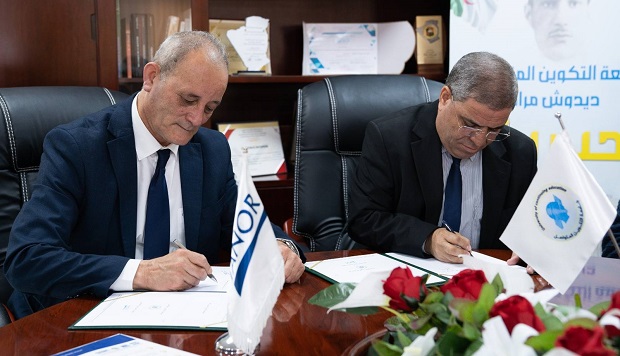
Signing of a Partnership Agreement with the Algerian Institute for Standardization
University of Continuous Education – Didouche Mourad
Media and Communication Unit
On Sunday, May 18, 2025, the University of Continuous Education and the Algerian Institute for Standardization signed a framework partnership agreement to establish a structured framework for aligning the university’s operations with international standards, aiming to obtain ISO 9001 certification, achieve compliance, and enhance the continuous improvement of public services provided by the university.
The agreement was signed by Prof. Yahia Jafri, Rector of the University, and Mr. Djamel Hales, Director of the Institute. Prof. Jafri emphasized the importance of aligning the university’s activities with international quality standards, especially given its rapid expansion in education and training. The university has seen a significant increase in student enrollment, rising from 12,000 to nearly 70,000 students over the past three years across Bachelor’s and Master’s programs. It is now preparing for doctoral accreditation following the graduation of its first Master’s cohorts.
Additionally, the university is expanding its training offerings into new specializations, increasing its operational workload. It operates nationwide across 54 centers and 10 branches with a hybrid education system, combining online platforms with in-person learning. This requires the implementation of a comprehensive quality management plan that addresses all aspects of university operations in line with sectoral directives.
On his part, Mr. Djamel Hales, Director of the Algerian Institute for Standardization, highlighted the importance of partnerships with higher education and scientific research institutions, including the University of Continuous Education. He stressed the specialized intervention of qualified experts, who will initially work on establishing a quality management framework tailored to the university’s academic and training activities, ensuring ISO 9001 certification. This will be followed by validating improvement plans across various university operations.
The institute will also collaborate with the university to develop a practical and sustainable strategy for continuous performance improvement over time, reinforcing the significance of quality management in serving the wider community.





